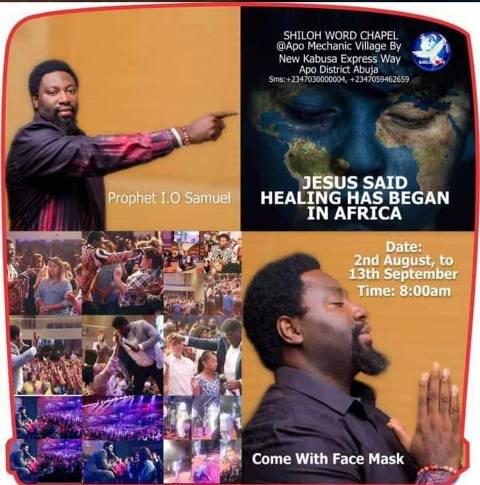 Page from Prophet I.O. Samuel's Facebook profile.
Page from Prophet I.O. Samuel's Facebook profile.
[This is an excerpt from an article appearing in The Round Table: The Commonwealth Journal of International Affairs. Views expressed in articles do not reflect the opinion of the Editorial Board.]
Although there has been a plethora of studies on Nigeria’s electoral process including a recently published special issue of this journal, there is a conspicuous absence of coverage of the trending phenomenon of electoral ‘prophetism’. This phenomenon entails the prediction of electoral outcomes by certain religious leaders, attributing the predictions to supernatural powers. Unfortunately, this profusely hyped and pronounced aspect of the electoral process and its implications is yet to receive adequate academic attention, even though it is a norm in Nigeria: usually, before the Independent National Election Commission (INEC) releases the names of political parties and candidates, the media is inundated with an avalanche of prophecies, pointing to possible winners or losers.
Electoral prophecies reached their peak in 2015 where several prophecies affirmed that former President Jonathan would win. Amid these prophecies, former ex-militants from Jonathan’s region, which produces 90% of Nigeria’s carbon export, threatened that if the election outcome turned out otherwise, there would be war and that the country will be starved of oil. On their part, the All Progressives Congress (APC), driven by suspicion, issued a threat that if the elections were rigged in favour of the People’s Democratic Party (PDP), the party will form a parallel government. Meanwhile, the popular and controversial Catholic priest, Rev. Mbaka had prophesied President Buhari’s win in the election.
While in 2019, some prophesied that elections might not be held, others like Prophet I.O. Samuel said there will be a cancellation of elections, which would spike violence. Popular televangelist Prophet TB Joshua revealed that there would be an interruption of Nigeria’s democratic practice unless prayers are made to avert it. Prophet Samuel Akinbodunse who had prophesied the death of President Buhari before the 2019 presidential election declared ‘if he tries to contest for the second term before the vote he will die’, after President Buhari expressed interest to contest in 2019. Some predicted that President Buhari would win the presidential election; others pointed to a win by Atiku Abubakar. Yet others declared that neither of them would win. Prophet Emmanuel Stephen said he foresaw Atiku sitting on a throne decorated with the country’s colours, but someone had come and removed the throne compelling Atiku to sit on the floor. And when the throne reappeared, it was President Buhari who sat on it. For his part, Prophet David Babalola said Atiku had been ordained Nigeria’s President since 2012 and declared that he would win the presidential election. But he warned that the present (Buhari’s) government might not want to hand over the presidency. Prophet Okechukwu Udoka stated that ‘My message to Nigerians is to go out and obey the mind of God. He has chosen Atiku’. More frightening was the prophecy by Primate Elijah Ayodele that Nigeria would divide in 2019.
Perhaps these prophecies reinforced the defiant posture of the PDP in rejecting the INEC declared result which showed President Buhari score 15,191,847 votes to defeat his main opponent, Atiku Abubakar who polled 11,262,978. Rather, the PDP presented another presidential result allegedly from a non-existent INEC server which showed that its candidate polled 18,356,732 votes to defeat President Buhari who apparently polled 16,741,430 votes. Despite the Supreme Court ruling affirming the victory of President Buhari, the PDP National Working Committee (NWC) still called for a judicial review of the judgement.
Startlingly, in his 2019 New Year prophecy, Rev Mbaka declared that opposition candidate Hope Uzodinma of the APC has been spiritually empowered to become the governor of Imo State. This claimed prophetic utterance was in contempt of court, since the Supreme Court was yet to issue judgement on the matter concerning the governorship. And when the Supreme Court eventually ruled in favour of Hope Uzodinma, nullifying INEC’s declaration of Emeka Ihedioha as the winner, it sparked off accusations and counter-accusations.
Afamefune Patrick is with the Department of Political Science, University of Nigeria, Nsukka.



